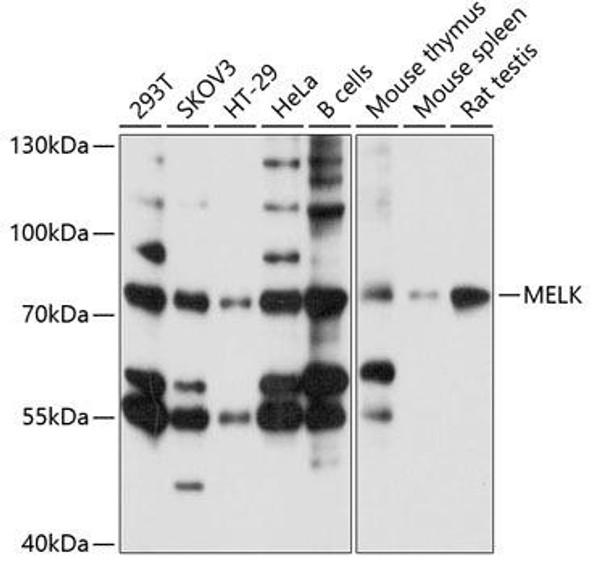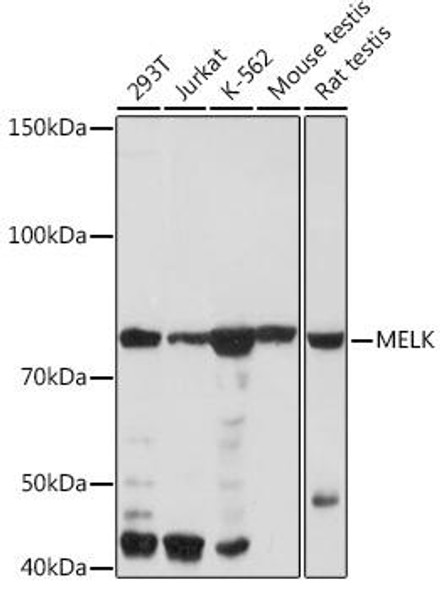Description
| Product Name: | Phospho-MELK-T167/S171 Rabbit pAb |
| Product Code: | CABP1175 |
| Size: | 20uL, 50uL, 100uL |
| Synonyms: | MELK, HPK38, maternal embryonic leucine zipper kinase |
| Applications: | WB |
| Reactivity: | Human |
| Host Species: | Rabbit |
| Immunogen: | A phospho synthetic peptide corresponding to residues surrounding T167/S171 of Human MELK. |
| Applications: | WB |
| Recommended Dilutions: | WB 1:500 - 1:2000 |
| Reactivity: | Human |
| Immunogen: | A phospho synthetic peptide corresponding to residues surrounding T167/S171 of Human MELK. |
| Purification Method: | Affinity purification |
| Storage: | Store at -20°C. Avoid freeze / thaw cycles. Buffer: PBS with 0.02% sodium azide, 50% glycerol, pH7.3. |
| Isotype: | IgG |
| Sequence: | Email for sequence |
| Gene ID: | 9833 |
| Uniprot: | Q14680 |
| Cellular Location: | Cell membrane, Peripheral membrane protein |
| Calculated MW: | 52kDa/59kDa/66kDa/69kDa/70kDa/71kDa/74kDa |
| Observed MW: | Refer to figures |
| UniProt Protein Function: | MELK: Serine/threonine-protein kinase involved in various processes such as cell cycle regulation, self-renewal of stem cells, apoptosis and splicing regulation. Has a broad substrate specificity; phosphorylates BCL2L14, CDC25B, MAP3K5/ASK1 and ZNF622. Acts as an activator of apoptosis by phosphorylating and activating MAP3K5/ASK1. Acts as a regulator of cell cycle, notably by mediating phosphorylation of CDC25B, promoting localization of CDC25B to the centrosome and the spindle poles during mitosis. Plays a key role in cell proliferation and carcinogenesis. Required for proliferation of embryonic and postnatal multipotent neural progenitors. Phosphorylates and inhibits BCL2L14, possibly leading to affect mammary carcinogenesis by mediating inhibition of the pro-apoptotic function of BCL2L14. Also involved in the inhibition of spliceosome assembly during mitosis by phosphorylating ZNF622, thereby contributing to its redirection to the nucleus. May also play a role in primitive hematopoiesis. Monomer. Interacts with ZNF622 and PPP1R8. Up-regulated in many cancers cells. Up-regulated upon treatment with radiation or 5-fluorouracil (5-FU) in colorectal cancer cells, suggesting that it might be associated with increased resistance of colorectal cells against radiation and 5- FU. Down-regulated upon siomycin A, a thiazole antibiotic, treatment, leading to inhibit tumor growth in vivo. Expressed in placenta, kidney, thymus, testis, ovary and intestine. Activated by autophosphorylation of the T-loop at Thr-167 and Ser-171: in contrast to other members of the SNF1 subfamily, phosphorylation at Thr-167 is not mediated by STK11/LKB1 but via autophosphorylation instead. Inhibited by calcium-binding. Kinase activity is also regulated by reducing agents: dithiothreitol (DTT) or reduced glutathione are required for kinase activity in vitro; such dependence is however not due to the presence of disulfide bonds. Belongs to the protein kinase superfamily. CAMK Ser/Thr protein kinase family. SNF1 subfamily. |
| UniProt Protein Details: | Protein type:Protein kinase, Ser/Thr (non-receptor); Kinase, protein; Protein kinase, CAMK; EC 2.7.10.2; RNA splicing; EC 2.7.11.1; CAMK group; CAMKL family; MELK subfamily Chromosomal Location of Human Ortholog: 9p13.2 Cellular Component: cell cortex; membrane; nucleus; plasma membrane Molecular Function:calcium ion binding; non-membrane spanning protein tyrosine kinase activity; protein binding; protein serine/threonine kinase activity Biological Process: apoptosis; cell proliferation; G2/M transition of mitotic cell cycle; hemopoiesis; positive regulation of apoptosis; protein amino acid autophosphorylation |
| UniProt Code: | Q14680 |
| NCBI GenInfo Identifier: | 50400857 |
| NCBI Gene ID: | 9833 |
| NCBI Accession: | Q14680.3 |
| UniProt Secondary Accession: | Q14680,A6P3A7, A6P3A8, B1AMQ6, B7Z1E6, B7Z5M5, B7Z6Q7 B7Z6R8, B7Z6Y0, B7Z7Q1, D3DRP8, F5H0Y0, |
| UniProt Related Accession: | Q14680 |
| Molecular Weight: | 69,116 Da |
| NCBI Full Name: | Maternal embryonic leucine zipper kinase |
| NCBI Synonym Full Names: | maternal embryonic leucine zipper kinase |
| NCBI Official Symbol: | MELK |
| NCBI Official Synonym Symbols: | HPK38 |
| NCBI Protein Information: | maternal embryonic leucine zipper kinase |
| UniProt Protein Name: | Maternal embryonic leucine zipper kinase |
| UniProt Synonym Protein Names: | Protein kinase Eg3; pEg3 kinase; Protein kinase PK38; hPK38; Tyrosine-protein kinase MELK (EC:2.7.10.2) |
| Protein Family: | Maternal embryonic leucine zipper kinase |
| UniProt Gene Name: | MELK |
| UniProt Entry Name: | MELK_HUMAN |






